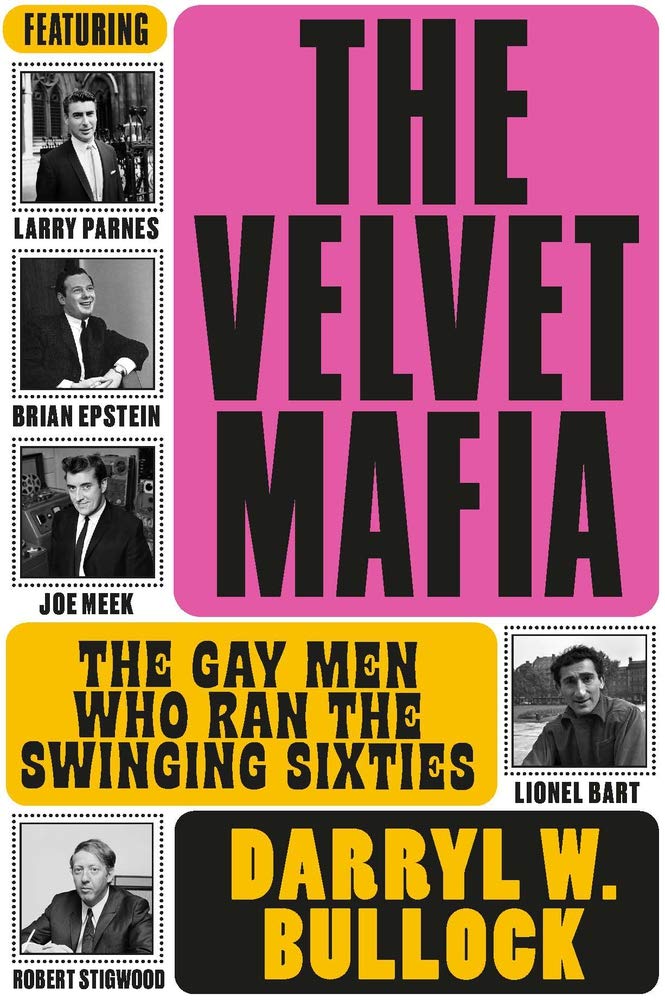
DARRYL W. BULLOCK – The Velvet Mafia: The Gay Men Who Ran the Swinging Sixties
- by J.N.
- Posted on 24-03-2021
"The Velvet Mafia: The Gay Men Who Ran the Swinging Sixties" by skilled author Darryl W. Bullock is something out of the ordinary and a hugely fascinating study of some of the most legendary (and in many cases infamous) managers, promotors, record label executives, artists, and producers who populated the London scene back in the 50s and 60s. Not only is this a thought-provoking and reflective read and an in-depth study of how some of the most successful pop and rock groups of the time were managed or produced by gay men, but also utterly revelatory and revealing.
Following the skiffle boom in post-war UK back in the fifties, rock ‘n’ roll landed on British shores and changed the music industry forever there, just as it had done in the US. Not surprisingly, many saw the idea of producing records, organizing tours, managing bands and solo performers, releasing and distributing singles and LPs and whatnot, as the perfect way to make money and grow a business. Teenagers desperately wanted to feel closer to their pop and rock heroes and so the demand was there – someone simply had to supply them with the goods.
Some of the main characters that populate this deftly written and expertly crafted piece of literature are The Beatles manager Brian Epstein, The Who manager Kit Lambert, Bee Gees and Cream manager Robert Stigwood, talented songwriter Lionel Bart, innovative record producer Joe Meek, and impresario and pop manager Larry Parnes (Tommy Steele, Billy Fury, etc.). Many intriguing and quite complex (but not necessarily gay) personas enter the narrative too along the way, some of which are Dusty Springfield, Judy Garland, and the fearsome crime overlords known as the Kray Twins. The number of ties between those music industry leaders, TV actors, various (high ranking) politicians, business moguls, and members of the mafia who were homosexual are staggering, and some of them would occasionally meet up or socialize with each other in dingy bars and secret gay clubs across London. There were plenty of hushed-up affairs – some of which had terrible outcomes. The 50s and 60s were the period leading up to the partial decriminalization of homosexuality in Britain and so the whole notion of being branded gay back in those days could have severe consequences, which sadly entailed that blackmail, social stigmatization, and the burden of living with a secret that could effectively kill your career was a menacing threat constantly lurking in the shadows for some of these people.
Bullock paints vivid, deeply interesting, and nuanced portraits of the aforementioned cast of pioneers and the superbly written chapters involving Joe Meek are worth the price of the book alone. Some were ruthless and lacked empathy, others were caring and generous, but one could argue that many of them essentially were lonely existences. What often stands out throughout these 368 pages is how devoted and dedicated these people were to their craft and role within the music industry and also how uncompromising they were at times – for better or worse.
"The Velvet Mafia" is much more than simply a book on how music history was partially shaped by homosexual men; it also revolves around British society and its norms, values, and conventions all those years ago. As such, it is both a moving account of the fates of the men and women who had an undeniable influence on the arts and a vigorous discussion of their role in the changing of society and how things have progressed since then. A few paragraphs did strike me as being slightly convoluted and some passages came across as labyrinthine with respect to their purpose and point, but overall, this is a marvelous book and comes highly recommended. Excellent!
The Velvet Mafia: The Gay Men Who Ran the Swinging Sixties – omnibuspress.com
